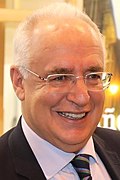Top Qs
Timeline
Chat
Perspective
2019 Riojan regional election
Election in the Spanish region of La Rioja From Wikipedia, the free encyclopedia
Remove ads
The 2019 Riojan regional election was held on Sunday, 26 May 2019, to elect the 10th Parliament of the autonomous community of La Rioja. All 33 seats in the Parliament were up for election. It was held concurrently with regional elections in eleven other autonomous communities and local elections all throughout Spain, as well as the 2019 European Parliament election.
The election saw the Spanish Socialist Workers' Party (PSOE) becoming the most-voted political force in a regional election in La Rioja for the first time since 1991, allowing the party to elect her candidate, Concha Andreu, as new regional president through an alliance with Unidas Podemos. The ruling People's Party (PP), which had governed the region without interruption since 1995, obtained the worst result in its history.
Remove ads
Overview
Summarize
Perspective
Electoral system
The Parliament of La Rioja was the devolved, unicameral legislature of the autonomous community of La Rioja, having legislative power in regional matters as defined by the Spanish Constitution and the Riojan Statute of Autonomy, as well as the ability to vote confidence in or withdraw it from a regional president.[1] Voting for the Parliament was on the basis of universal suffrage, which comprised all nationals over 18 years of age, registered in La Rioja and in full enjoyment of their political rights. Additionally, Riojans abroad were required to apply for voting before being permitted to vote, a system known as "begged" or expat vote (Spanish: Voto rogado).[2]
The 33 members of the Parliament of La Rioja were elected using the D'Hondt method and a closed list proportional representation, with an electoral threshold of five percent of valid votes—which included blank ballots—being applied regionally.[1][3]
Election date
The term of the Parliament of La Rioja expired four years after the date of its previous election. Elections to the Parliament were fixed for the fourth Sunday of May every four years. The previous election was held on 24 May 2015, setting the election date for the Parliament on Sunday, 26 May 2019.[1][3][4]
The president had the prerogative to dissolve the Parliament of La Rioja and call a snap election, provided that no motion of no confidence was in process, no nationwide election was due and some time requirements were met: namely, that dissolution did not occur either during the first legislative session or within the legislature's last year ahead of its scheduled expiry, nor before one year had elapsed since a previous dissolution. In the event of an investiture process failing to elect a regional president within a two-month period from the first ballot, the Parliament was to be automatically dissolved and a fresh election called. Any snap election held as a result of these circumstances would not alter the period to the next ordinary election, with elected deputies merely serving out what remained of their four-year terms.[1]
The election to the Parliament of La Rioja was officially triggered on 2 April 2019 after the publication of the election decree in the Official Gazette of La Rioja (BOR), scheduling for the chamber to convene on 20 June.[5]
Remove ads
Parties and candidates
Summarize
Perspective
The electoral law allowed for parties and federations registered in the interior ministry, coalitions and groupings of electors to present lists of candidates. Parties and federations intending to form a coalition ahead of an election were required to inform the relevant Electoral Commission within ten days of the election call, whereas groupings of electors needed to secure the signature of at least one percent of the electorate in La Rioja, disallowing electors from signing for more than one list of candidates.[3][4]
Below is a list of the main parties and electoral alliances which contested the election:
Remove ads
Opinion polls
Summarize
Perspective
The table below lists voting intention estimates in reverse chronological order, showing the most recent first and using the dates when the survey fieldwork was done, as opposed to the date of publication. Where the fieldwork dates are unknown, the date of publication is given instead. The highest percentage figure in each polling survey is displayed with its background shaded in the leading party's colour. If a tie ensues, this is applied to the figures with the highest percentages. The "Lead" column on the right shows the percentage-point difference between the parties with the highest percentages in a poll. When available, seat projections determined by the polling organisations are displayed below (or in place of) the percentages in a smaller font; 17 seats were required for an absolute majority in the Parliament of La Rioja.
- Color key:
Poll conducted after legal ban on opinion polls
Remove ads
Results
Remove ads
Aftermath
Remove ads
Notes
References
Wikiwand - on
Seamless Wikipedia browsing. On steroids.
Remove ads









